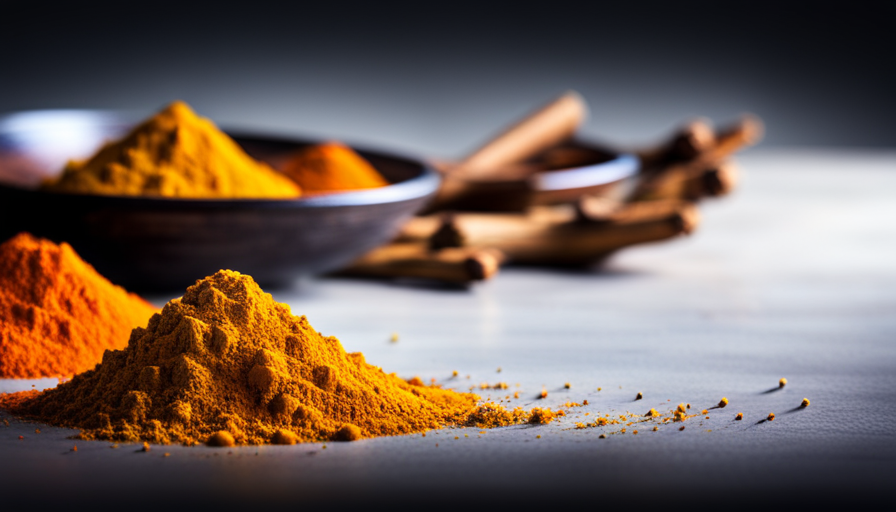As an individual continually searching for natural ways to enhance my health, I stumbled upon the advantages of drinking turmeric tea not too long ago. This brightly colored yellow drink isn’t just tasty but is also packed with substances thought to lower inflammation and foster general health.
However, as with any supplement or herbal remedy, it’s important to understand the recommended daily intake and how to best incorporate it into your routine.
So, how many cups of turmeric tea should you drink each day? While there isn’t a one-size-fits-all answer to this question, various factors can impact how much turmeric your body can absorb and utilize effectively.
In this article, we’ll explore the recommended daily intake of turmeric, what affects its absorption in the body, different ways to prepare turmeric tea, and when may be the best time to enjoy a cup. Whether you’re new to drinking turmeric tea or looking for ways to maximize its benefits, read on for all you need to know about incorporating this powerful spice into your daily routine.
Key Takeaways
- The recommended daily intake of turmeric tea is no more than 1-2 teaspoons per day, depending on health goals and medical conditions.
- Turmeric supplements can have side effects if taken in excessive amounts.
- Factors affecting turmeric absorption include food consumed alongside it and method of preparation.
- Consuming turmeric tea in moderation, incorporating it into daily routine, and consulting a healthcare provider before taking any supplements are key.
Recommended Daily Intake of Turmeric
You should aim to consume no more than 1-2 teaspoons of turmeric per day, so don’t go overboard with your turmeric tea obsession and risk any negative side effects.
The recommended intake of turmeric varies depending on the individual’s health goals and medical conditions. For instance, those with digestive issues may benefit from a lower dose of turmeric while people dealing with chronic pain require higher doses. It’s always best to consult a healthcare provider before taking any turmeric supplements or increasing your intake.
Turmeric supplements are often marketed as an easy way to boost one’s daily intake of this beneficial spice. However, it’s important to note that these supplements can also have side effects if taken in excessive amounts. Moreover, they’re not regulated by the FDA like medications are, meaning there’s no guarantee on their quality or effectiveness. If you do decide to take a turmeric supplement, make sure you choose one from a reputable brand and follow the recommended dosage.
Factors that affect turmeric absorption include the type of food consumed alongside it and the method of preparation used for cooking or brewing tea. To get the most out of your cup of turmeric tea, try adding black pepper which contains piperine – a compound that enhances curcumin absorption in the body. Additionally, brewing fresh ginger root along with your tea can further enhance its anti-inflammatory properties.
With these tips in mind, enjoy your cup (or two) of deliciously healthy turmeric tea!
Factors that Affect Turmeric Absorption
Did you know that the way you consume turmeric can affect its absorption in your body? Several factors affecting bioavailability can impact how much of turmeric’s active compounds, called curcuminoids, are absorbed by your body. These include:
- Formulation: Turmeric supplements or extracts that use specialized formulations such as liposomal or nanoparticle technologies may have better bioavailability than standard formulations.
- Dosage: Higher doses of curcuminoids can lead to lower bioavailability due to limited solubility and poor absorption.
- Fat content: Curcuminoids are fat-soluble, which means consuming turmeric with a source of dietary fat can improve their absorption. Adding coconut oil or ghee to your turmeric tea is an easy way to increase its bioavailability.
- Heat: Heat can enhance the solubility and stability of curcuminoids, making them more readily available for absorption. Brewing hot turmeric tea instead of consuming cold beverages containing turmeric may yield better results.
- Black pepper: Piperine, a compound found in black pepper, has been shown to improve curcuminoid absorption by up to 2,000%. Adding a pinch of black pepper powder to your turmeric tea could significantly enhance its health benefits.
These factors highlight the importance of considering how you prepare and consume turmeric tea if you want to reap its potential health benefits. Drinking one cup per day might not be enough if it’s not being absorbed properly into your body.
In the next section about different ways to prepare turmeric tea, I’ll share some simple but effective tips on how to make sure you’re getting the most out of this powerful spice.
Different Ways to Prepare Turmeric Tea
When it comes to enjoying the full benefits of turmeric, one way to do so is by exploring different methods of preparing this spice-infused drink. Turmeric tea benefits are numerous, such as reducing inflammation and promoting good digestion.
One popular method of making turmeric tea involves simmering fresh or dried turmeric root in water with additional ingredients like ginger, cinnamon, or honey for added flavor. Another way to enjoy turmeric tea is by adding a teaspoon of ground turmeric powder directly into a cup of hot water and stirring until well mixed. This method is quick and easy, but may not provide the same depth of flavor as other preparation methods.
Alternatively, you can prepare a cold brew version of turmeric tea by steeping fresh or dried turmeric root in cold water overnight for a refreshing and invigorating drink. If you want to experiment with different flavor combinations for turmeric tea, try adding black pepper to enhance absorption or lemon juice for an extra zesty kick. You can also adjust the amount of sweetener used depending on your taste preferences.
Keep in mind that while there is no recommended limit on how much turmeric tea you can drink per day, it’s important to listen to your body and consume in moderation. As I move onto discussing the best time to drink turmeric tea, it’s important to note that there isn’t necessarily a specific step when it comes to consuming this beverage. However, taking into consideration its potential health benefits such as aiding digestion and reducing inflammation, drinking a cup before or after meals may be beneficial for some individuals.
Best Time to Drink Turmeric Tea
Imagine waking up to a warm and soothing cup of turmeric tea, sipping it slowly as you start your day feeling refreshed and ready to take on anything that comes your way. While it’s great to have turmeric tea in the morning, did you know that drinking it at night can also have its benefits? Here are four reasons why drinking turmeric tea at night might be the best time for you:
-
Promotes Better Sleep: Turmeric contains an active ingredient called curcumin, which has been known to help improve sleep quality by reducing inflammation and oxidative stress.
-
Aids Digestion: Drinking turmeric tea at night can help with digestion as it contains properties that stimulate bile production, which aids in breaking down food more efficiently.
-
Reduces Stress Levels: The calming effects of turmeric tea can help reduce stress levels at night before bed, making it easier for you to fall asleep.
-
Boosts Immunity: Turmeric is a natural immune booster due to its anti-inflammatory properties, so drinking it at night may help strengthen your immune system while you sleep.
Incorporating turmeric tea into your daily routine doesn’t have to be complicated or overwhelming. There are many different ways to prepare this delicious beverage. From traditional methods like boiling water with fresh ginger and honey added in for sweetness, to using pre-made blends available online or in stores. Regardless of how you choose to make your cup of turmeric tea, incorporating this healthy drink into your daily routine could provide numerous health benefits!
Incorporating Turmeric Tea into Your Daily Routine
If you’re looking to spice up your daily routine, why not give turmeric tea a shot? Adding this flavorful drink to your repertoire can be just the kick in the pants you need to start feeling like yourself again. But how much should you drink each day? The answer is that it depends on your individual needs and preferences.
Turmeric tea has numerous benefits for your body, including reducing inflammation and boosting immunity. Additionally, it’s available in several varieties, such as ginger turmeric or cinnamon turmeric. Each type has its unique flavor profile and nutritional benefits. Therefore, incorporating different varieties of turmeric tea into your daily routine can help keep things interesting while providing various health advantages.
To incorporate turmeric tea into my daily routine, I created a table outlining my schedule for drinking it. In the morning, I enjoy a cup of ginger turmeric tea with breakfast to jump-start my day. In the afternoon, I switch things up by having a cup of cinnamon turmeric tea with lunch to help me power through the rest of my workday. Finally, in the evening after dinner, I sip on a plain turmeric tea before bed to relax and unwind from a busy day. By using this table as a guide, I’ve been able to make sure that I’m getting enough turmeric every day while enjoying all its delicious flavors at different times.
Incorporating different varieties of turmeric tea into your daily routine can be beneficial for both taste buds and overall health. With so many options available and no strict guidelines on how much one should drink per day, it’s easy to customize this drink based on personal preference and desired outcomes. Next step: combining turmeric with other natural remedies for even more wellness benefits!
Combining Turmeric with Other Natural Remedies
I’ve found that combining turmeric with other natural remedies can be a great way to enhance its benefits. Two natural remedies that I’ve personally tried and found effective are turmeric and green tea, as well as turmeric and CBD oil.
Both of these combinations have been shown to have anti-inflammatory properties, which is why they work so well together. Plus, they’re easy to incorporate into your daily routine!
Turmeric and Green Tea
Turmeric and green tea are a delicious and healthy combination that offers numerous health benefits when consumed regularly. Here are some reasons why this duo is worth trying:
-
Turmeric and green tea both contain powerful antioxidants that help protect the body against free radicals. These radicals can damage cells and contribute to chronic diseases.
-
Green tea contains catechins, a type of antioxidant that has been linked to a reduced risk of cancer, heart disease, and Alzheimer’s.
-
Turmeric contains curcumin, an antioxidant with anti-inflammatory properties. This may help reduce joint pain, improve brain function, and aid in weight loss.
In addition to their antioxidant properties, turmeric and green tea have also been studied for their potential health benefits when it comes to weight loss and inflammation. Some studies suggest that the combination of these two ingredients may be especially effective at promoting fat loss by increasing metabolism. The anti-inflammatory effects of turmeric may also help alleviate symptoms of conditions like arthritis or inflammatory bowel disease.
With its numerous health benefits, it’s no wonder why turmeric is often used in combination with other natural remedies like CBD oil. But before we delve into this topic further, let’s explore how turmeric works alongside another popular ingredient – ginger!
Turmeric and CBD Oil
Combining CBD oil with turmeric has become increasingly popular, with a recent survey reporting that 42% of CBD users also use turmeric for its potential health benefits. Both turmeric and CBD oil have been individually studied for their potential to reduce anxiety and promote overall well-being, making them a natural pairing for those seeking alternative remedies.
Turmeric contains curcumin, which has been shown to have anti-inflammatory and antioxidant properties. Meanwhile, CBD oil interacts with the body’s endocannabinoid system to potentially reduce stress and anxiety. Together, these two substances may provide even greater benefits when consumed together.
Some studies suggest that combining turmeric and CBD oil may help reduce inflammation in the body, leading to improved overall health. As more research is conducted on this combination, it’s likely that we’ll learn even more about how they work together to promote wellness.
In the next section, we’ll explore some delicious turmeric tea recipes that can be tailored to specific health needs.
Turmeric Tea Recipes for Specific Health Benefits
For those seeking specific health benefits, try incorporating turmeric tea recipes into your daily routine. Turmeric has many medicinal properties that can help with weight loss and inflammation. Here are four turmeric tea recipes you can make at home to improve your overall well-being:
-
Golden Milk Tea: Mix one teaspoon of ground turmeric, a pinch of cinnamon, and a dash of black pepper in a glass of warm milk. Stir well and drink before bedtime.
-
Ginger-Turmeric Tea: Boil one cup of water with one slice of fresh ginger and half a teaspoon of ground turmeric for 5 minutes. Strain the mixture and add honey to taste.
-
Turmeric-Lemon Tea: Squeeze half a lemon into a cup of hot water and add one teaspoon each of ground turmeric and honey. Stir well and enjoy.
-
Spiced Turmeric Tea: In a pot, combine two cups of water, one cinnamon stick, two whole cloves, one cardamom pod (crushed), and half a teaspoon each of ginger powder and ground turmeric. Bring to boil for 5 minutes then let it steep for another 10 minutes before straining.
These recipes not only taste good but can also provide various health benefits depending on which recipe you choose. For example, golden milk tea is known to aid digestion while ginger-turmeric tea can reduce inflammation in the body. Additionally, studies have shown that drinking turmeric tea regularly may even lead to weight loss.
If you’re interested in improving the health of your skin, stay tuned for our next section on how turmeric tea can benefit your complexion without any harsh chemicals or expensive treatments needed!
Turmeric Tea for Skin Health
If you want to improve your skin health, incorporating turmeric into your daily routine can help. Studies have shown a 45% reduction in acne when using a topical application of turmeric extract due to its anti-inflammatory and antibacterial properties. These properties help to reduce inflammation and prevent the growth of acne-causing bacteria.
But did you know that drinking turmeric tea can benefit your skin? Turmeric tea contains curcumin, the active ingredient in turmeric, which has been shown to have antioxidant properties that protect against damage from free radicals. Free radicals are unstable molecules that can damage cells and contribute to aging and disease.
In addition, curcumin has been found to boost collagen production, which helps keep skin firm and elastic. This makes turmeric tea a great choice for those looking for an anti-aging solution. So, whether you’re looking to clear up acne or prevent wrinkles, adding turmeric tea to your daily routine may be just what your skin needs.
Frequently Asked Questions
Can turmeric tea help with weight loss?
I’ve personally found that incorporating turmeric tea into my daily routine has had numerous benefits for my overall health and well-being. Not only does it taste delicious, but turmeric tea is also known to have anti-inflammatory properties and can aid in digestion.
Additionally, some studies suggest that turmeric may play a role in weight loss by helping to regulate blood sugar levels and reduce inflammation in fat tissues. There are many different recipes available for making turmeric tea at home, so it’s easy to find one that suits your taste preferences.
Overall, I highly recommend incorporating this potent spice into your diet through the consumption of turmeric tea as part of a healthy lifestyle.
What are the potential side effects of drinking too much turmeric tea?
When it comes to turmeric tea, it’s important to be aware of potential side effects.
While turmeric is generally safe in moderate amounts, consuming too much can lead to negative side effects such as upset stomach, dizziness, and diarrhea.
Additionally, turmeric may interact with certain medications and should be avoided by people with gallbladder issues or those who are pregnant or breastfeeding.
It’s important to monitor your daily turmeric intake and consult with a healthcare professional if you have any concerns about incorporating this spice into your diet.
Is it safe to drink turmeric tea while pregnant or breastfeeding?
As someone who’s pregnant or breastfeeding, it’s important to be cautious about what you consume. While turmeric tea has many potential health benefits for postpartum recovery, there are pregnancy restrictions on its consumption.
The American Pregnancy Association recommends limiting your intake of turmeric during pregnancy to the amount typically found in food, as too much could stimulate the uterus and potentially cause harm. Additionally, there isn’t enough research on the effects of consuming turmeric while breastfeeding, so it’s best to err on the side of caution and avoid it altogether.
As always, consult with your healthcare provider before adding any new supplements or herbal remedies to your diet during this time.
Can turmeric tea interact with certain medications?
Hey there! Before diving into how many cups of turmeric tea you should have, let’s talk about potential drug interactions. Turmeric can interact with certain medications, including blood thinners, diabetes medication, and stomach acid reducers. So if you’re taking any medication regularly, it’s important to check with your healthcare provider before adding turmeric tea to your routine.
As for dosage recommendations, most studies use doses ranging from 500-2,000 mg per day of curcumin (the active compound in turmeric). However, the amount of curcumin in a cup of turmeric tea can vary widely depending on the recipe and preparation method. It’s always best to start with a small amount and gradually increase as tolerated.
Remember that moderation is key when it comes to any supplement or herbal remedy!
Is there a specific brand or type of turmeric that is best for making tea?
When it comes to making turmeric tea, there are a variety of ways you can prepare it. Turmeric tea recipes typically involve steeping fresh or dried turmeric root in hot water with other ingredients such as ginger, honey, or lemon.
As for the type of turmeric to use, it’s best to choose high-quality organic turmeric powder or fresh turmeric root from a reputable source. The benefits of drinking turmeric tea are numerous, including its anti-inflammatory properties and potential ability to improve brain function and lower the risk of heart disease.
While there isn’t necessarily a specific brand or type of turmeric that is best for making tea, opting for high-quality sources will ensure that you’re receiving the most health benefits from this powerful spice.
Conclusion
In conclusion, incorporating turmeric tea into my daily routine has been a game-changer for my health and wellness. With its anti-inflammatory properties and numerous health benefits, it’s no wonder that turmeric has been used for centuries in Ayurvedic medicine.
However, it’s important to note that the recommended daily intake of turmeric varies depending on factors such as age, weight, and overall health. Just like how a single drop of water can create ripples throughout an entire pond, the effects of regularly drinking turmeric tea can have a profound impact on our well-being.
By taking advantage of the different ways to prepare turmeric tea and combining it with other natural remedies, we can unlock the full potential of this potent spice. So why not give it a try? Your body’ll thank you for it!










